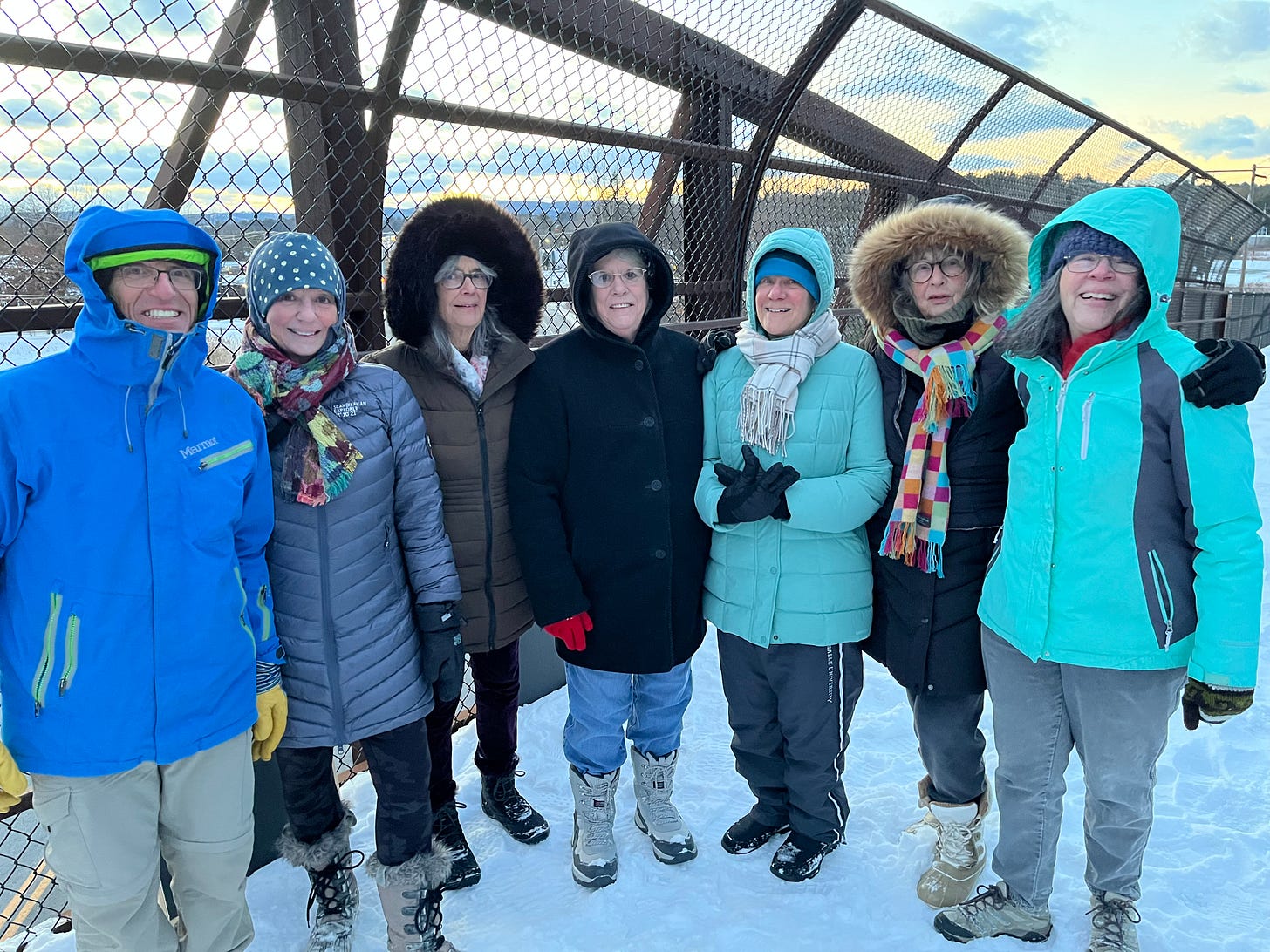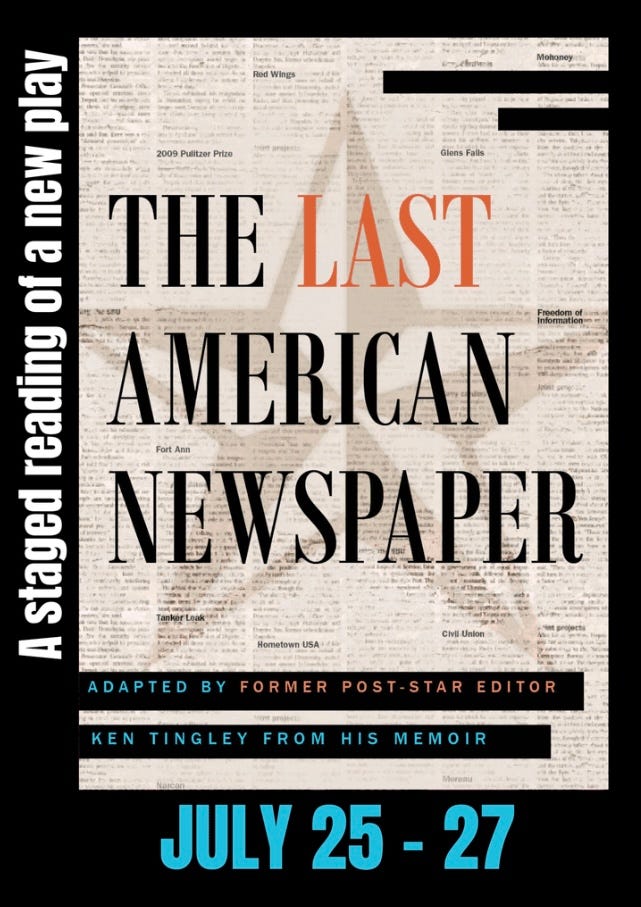Last American Newspaper coming to a theater near you
ProPublica reports this from the EPA: `We are being terrorized'
Please consider supporting The Front Page with a paid subscription: HERE
My 21 years as editor of The Post-Star was a thrill-a-minute experience.
When I retired nearly five years ago, I realized there was a unique catalog of work that rivaled any small newspaper in the country.
Consider the news stories:
- A leaking tanker car forced the evacuation of the entire village of Fort Edward.
- A young reporter broke new ground with a story called "Growing Up Gay."
- After nearly a dozen teens died in underage drinking accidents, we led a crusade to stop teen drinking.
- One of our editors witnessed a murder that led to a dramatic series on domestic violence.
- Twenty-three seniors citizens died after a tour boat sank on Lake George.
- And Mark Mahoney won the Pulitzer Prize.
Editors and reporters like Maury Thompson, Will Doolittle, Don Lehman, Bob Condon and Mahoney - and many others - brought passion, smarts and relentless reporting every day and made the community a better place to live.
The story of our newspaper, of those dedicated professionals became my book The Last American Newspaper.
I'm especially proud the stories of the people I worked with - and the work they did - has been preserved for the public record.
And now it is a dramatic play.
Two years ago, I walked into the offices of the Adirondack Theater Festival with an idea for its new artistic director Miriam Weisfeld. As a long-time subscriber to the Adirondack Theater Festival I was worried about the half-full Wood Theater I had seen after the pandemic.
I wondered if a local story might get more people in those seats.
I told her I had a good one.
Not only did I have a story, but I had already adapted my book The Last American Newspaper into a play.
As brash as this was, Miriam did not throw me out.
Instead, she embraced the idea of a small-town newspaper staff and its impact on the community at a time when newspaper importance was being diminished every day.
She read the play.
What is left of the original version is the spirit and passion of my colleagues covering local events as the backdrop to the rise and fall of community newspapers all over the country.
The Last American Newspaper is a metaphor for what is happening to small newspapers everywhere.
While I know how to tell a newspaper story, Miriam tutored me in documentary theater - I didn't know that was a thing - and turning everyday newspaper life into drama.
Literally, my third act has been writing a third act
It was a year ago Miriam announced at the Adirondack Theater Festival fundraiser I was the guinea pig for a renewed commitment to creating local content for the theater festival.
Since then, it has been a relentless series of drafts and edits with the carrot of one day hearing professional actors speak my words to a Glens Falls audience.
Tonight at the ATF's annual fundraiser she will announce a "staged reading" July 25-27.
While I'm excited to hear the story come to fruition, it also brings a certain terror that maybe I don't know what I'm doing.
While writing a column for The Post-Star over three decades, I was used to people scrutinizing and often criticizing my work, but this is something different. This story is bigger, this story is not only about my newspaper, but the newspapers and experiences of reporters and editors all over the country.
That's a lot of responsibility and with newspapers diminished in so many ways, it is critical to remind citizens of the value they once held in our communities.
As editor, I once received an email from a reader who told me how much her father loved the newspaper.
"We put one in his casket so he would have something to read when he got to heaven," the reader wrote.
That's the stature our newspaper once held.
I'm hoping this story is a reminder of that.
And maybe most of all, I hope it renews their commitment to a free press.
It's a reminder we need more than ever.
It's never too late to support the Adirondack Theater Festival with a donation or turn out tonight to show your support in person because our lives in this communities are a series of dramatic events and I suspect many of you who have religiously supported my work over the years will be there in July because you are part of this journey as well.
It might be nice to see how it all ends.
Protecting EPA
There should be common ground between Republicans and Democrats in the Adirondacks about protecting the environment.
Dan Stec is a member of the Adirondack 46ers so he should know something about the beauty of the region.
Yet, the Environmental Protection Agency has been attacked over the past few weeks as never before with 300 experienced workers being forced out and threats of thousands more to come.
To get a sense of what we are losing, I urge you to read ProPublica's report on what is happening at the EPA and its dedicated professionals: "We Feel Terrorized”: What EPA Employees Say About the Decision to Stay or Go Under Trump."
Keep in mind that ProPublica is an "independent, nonprofit newsroom that produces investigative journalism."
It has been on the front lines of investigative reporting on the Supreme Court.
New year
We've been accepting paid contributions here at The Front Page for a year now. It was gratifying to see almost all of you who contributed last year are staying with us for another year.
We appreciate that more than ever as we continue to give context to local news and issues.
For those of you who supported us last year, thank you again. You will never know how inspirational it has been to have that support.

Friday night lights
The North Country Light Brigade, bundled up like Arctic Eskimos, was at it again Friday night with its lights illuminating the message over Quaker Road - "Stop Musk."
This mature group of mostly liberal activists has been at it all year, from the heat of the summer, through Election Day when they had to withstand heckling from two men in pickup trucks because they were exercising their freedom of speech.
Consider the effort Friday night as the eight of them, lugged their lights through five inches of snow on the Quaker Road bike path and withstood a breezy hour in a silent act of messaging.
You don't have to agree with them to admire their commitment.
My Diversity moment
When I took over as editor of The Post-Star, we had one female reporter and one female editor.
That gradually changed in the succeeding years and that was important if we were going to serve half our readers.
During a page one meeting, I remember our female wire editor pitched a story for Page 1 about advances in breast cancer detection for women. My first reaction was that this was not a front page story.
Then I thought about the young women pitching the story and how the world she lived in, and what mattered to her, was entirely different from the world of a middle-aged man.
We ran the story on the front page.
That's the value of having a diverse workforce, because we all have different upbringings, interests and values and that should be celebrated and encouraged.
It's important to remember that.
This past week, it was reported that because the Trump administration was ending all DEI initiatives, West Point was disbanding the following clubs: the National Society of Black Engineers Club; the Vietnamese-American Cadet Association; Spectrum, for L.G.B.T.Q. cadets; the Society of Women Engineers Club, the Latin Cultural Club and the Corbin Forum, a group to promote female leaders, founded in 1976 when women were first admitted to West Point. It was reported that all of the groups were ordered to “unpublish, deactivate, archive or otherwise remove all public-facing content.”
West Point will be the worse for it.
Call your U.S. Senator
If you don't like what you see in Washington, you might want to consider calling or emailing Sen. Kirsten Gillibrand, hey she used to be our congresswoman, or Sen. Charles Schumer.
Sen. Kirsten Gillibrand, 518 431-0120, https://www.gillibrand.senate.gov/contact/email-me/
Sen. Charles Schumer, 518 431-4070, https://www.schumer.senate.gov/contact/message-chuck
Ken Tingley spent more than four decades working in small community newspapers in upstate New York. Since retirement in 2020 he has written three books and is currently adapting his second book "The Last American Newspaper" into a play. He currently lives in Queensbury, N.Y.








Ken, I’m so proud to call you a friend , a colleague. What an accomplishment! You have dedicated your life to journalism , to providing topics of interest, of importance to our community. And now your play will b performed for us!
Bravo! 😉👍👏🏻👏🏻👏🏻
While certainly not the first woman to enter medical school, I was among the first year (1970, the year of riots that closed many campuses) that allowed more than 2-4 women/class. SUNY Buffalo was forced through sit-ins and student protests to expand from 100 students to 120 in their freshman class, the extra 20 all being Black, Hispanic, Asian and/or women (so a Black Woman was a 2-fer!). That increase in diversity was a sudden shift but it ultimately led to women now, nearly 50 years later, making up most of each medical school class. Black and other minority students are still not as fully represented as they should be, and stopping DEI will further set back that progress.